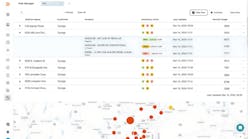A move to mandate the removal of flammable materials from cargo tank loading and unloading lines is again making its way through the halls of Congress, according to John Conley, National Tank Truck Carriers president.
The Democratic majority staff of the House Transportation and Infrastructure Committee currently is giving strong consideration to including language in the 2009 Highway Transportation Reauthorization Bill that, if approved by Congress, would enact the wetlines mandate.
Conley said the NTTC staff has not seen the exact language, but believes that the mandate could take place one year from enactment of the bill. Conley and Rich Moskowitz of the American Trucking Associations attended a meeting with some committee staff members May 1.
"We assume that the ban would require retrofit of existing trailers, though majority staff did ask a question regarding possible impact if the ban only applied to new trailers," Conley said. "We can expect the Hazardous Materials Act Reauthorization title of the bill to be completed rather quickly, so we do need to act now."
Carriers should review every cargo tank accident they have had in the last seven years involving petroleum to determine if there is any way the accident could be called a wetlines accident. A wetlines accident would be one in which product escaped from the wetlines but not from the compartment to which the line is attached. If there had been no product in the lines, no product would have spilled.
Carriers also should determine if there is any way that product escaped from the lines only and then caught fire resulting in the whole trailer burning. "We know that National Transportation Safety Board (NTSB) personnel have been calling carriers following some accidents to determine if they could have been wetlines accidents," Conley said. "They are looking for evidence to support their position that wetlines pose a significant safety hazard."
In addition, carriers should be prepared to write/contact their members of Congress to ask them to vote against this provision, if it moves forward. NTTC will develop information for carriers to use in contacting the Congressional representatives. "There is no need to make that contact now, but we do urge you to identify Congressmen representing districts where you have your headquarters or large terminals," Conley added.
He also said that at the meeting he and Moskowitz attended, the committee majority staff did not appear impressed with the fact that Department of Transportation (DOT) information indicates only two potential wetlines incidents--with no injuries--in the past six and one-half years.
"I believe that advocates of the ban, having twice failed to accomplish their objective through the regulatory process, are now trying to impose their will through Congressional action," Conley said. "The National Transportation Safety Board continues to try to gain evidence to support its past recommendations to ban wetlines.
"The challenge this time will be especially difficult since we are dealing with a legislative and not a regulatory process. To its credit, the Department of Transportation proposed regulation of wetlines through a rulemaking and, following overwhelming evidence from National Tank Truck Carriers and others that the costs far outweighed the benefits, the Pipeline and Hazardous Materials Safety Administration (PHMSA) eventually withdrew the rulemaking in 2005. Unfortunately, Congress does not have to consider cost/benefit analysis and has the power to simply tell PHMSA 'do it' without addressing the question of whether the ban should be done. This will, most likely, be a political, not a regulatory decision."
Conley noted that the issue will be discussed at the NTTC Annual Conference in San Diego CA May 10-12. "We also will alert other associations who worked with us to defeat this unnecessary proposal in 2005," he added. "NTTC staff will attend a May 14 hearing of the House Transportation and Infrastructure Committee where this issue may come up."








